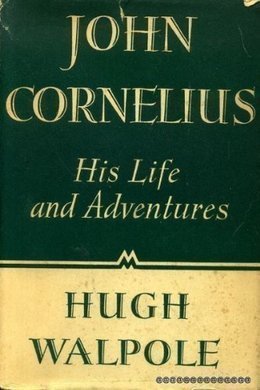
-
EPUB 439 KB
-
Kindle 582 KB
-
Support epubBooks by making a small $2.99 PayPal donation purchase.
This work is available for countries where copyright is Life+70 or less.
Description
Walpole, as the biographer of the life of John Cornelius, wrote a long, first person narrative of the life of a genius who could never bring his world of dreams in tune with the world of reality for himself or for those who read his books, a writer who strove desperately to produce serious novels, and who died famous and acknoledged for three slim volumes of fairy tales. Walpole wrote remantically of a character whose life was never very real, and who could not find happiness, except at odd moments because of this gulf between him and the world. Walpole’s romantic flights have realistic intermission to temper them.
574 pages with a reading time of ~8.75 hours (143535 words), and first published in 1937. This DRM-Free edition published by epubBooks, 2014.
Community Reviews
There are currently no other reviews for this book.
Excerpt
His mother was the daughter of William Baring, proprietor of the White Horse Inn at Caerlyn Sands. Baring, from all I ever heard, must have been a grand, boasting, foolish character, famous locally and known even in distant parts of Glebeshire. I have seen a brown faded daguerreotype of himself and his wife, she a small mean-faced woman with a tight mouth and with a locket almost as large as her face hanging on her meagre bosom. He greatly took my eye, big as an ox and dressed, for the occasion of the photograph, in awkward Sunday clothes, but his eyes were open and frank, his mouth strong and smiling. He carried in his hand one of those old top-hats with a broad and curling brim. Across his great spreading waistcoat was a vast gold watch-chain and against his trouser a fine swaggering fob. He looked as though he could swallow his mean little wife at a mouthful, but of course it wasn’t so. She swallowed him. For a time things went well with him. He made the ‘White Horse’ pay and was the best wrestler and boxer in North Glebeshire; a good cricketer too, I believe. Then horses were too much for him. He went to the races at Drymouth, drank more than he should, neglected his home (I should fancy out of distaste for Mrs. Baring). He was killed in a drunken fight in Drymouth, and his widow, with her four children, went to Polchester to live with a sister. They ran a small dressmaking business there and did fairly well with it. Of the two boys, Cornelius’ uncles, one went to sea, the other died in the South of Spain somewhere. Daisy Baring, Cornelius’ mother, must have been a most beautiful girl. In a faded photograph of her she is standing straight up, in her ridiculous ugly clothes, her head proudly erect, looking out into the world with an eagerness that seemed to expect, even to demand, anything and everything of it. Her eyes remind me of her son’s, filled with expectation, almost merry anticipation. She is tall and of fine carriage in this picture of her, strong- boned, firm-flanked, peasant stock, radiant with health. Soon she was stout and, later on, grossly fat. Laughing. Courageous. Hardworking. Stupid. Yes, I am sure that that was Daisy Cornelius. As a little girl she hated Polchester where, after her father’s death, she lived with her mother, her aunt and her brothers and sister. They lived in a poky little house beside the river at the bottom of Orange Street. She told John again and again of the Cathedral bells, the mist rising from the river, the cows lowing and the sheep bleating on market-days and the fluffy pieces of cloth and calico lying about from the dressmaking. She was always a country girl; she hated the town and her aunt; she would long passionately for her grand, broad-chested, brave, horse- riding father. She quarrelled with her aunt although she was really so good-tempered and warm-hearted, but her aunt was mean and meagre like her mother. So she went into the country to work on a farm, and there she met John’s father who was a gentleman and owned Penny Hall, an ironic name because he and his little bow-legged father hadn’t a farthing between them. John never saw Penny Hall where his grandfather lived. When he was grown-up and went to look for it it was gone; nothing left of it, only the rooks’ nests in the trees and the smell of dog-roses and, very faintly, the echo behind echo of the sea like a woman sighing or, when the wind was right, an old man heavily snoring. All the same, although John never saw Penny Hall, it was there as part of his life until he died. The Cornelius family had lived in it for hundreds and hundreds of years, ever since Hans Cornelius, the Dane, built it in thirteen hundred and something. He was a Danish sailor wrecked on the coast in a storm. He made money breeding horses and married a Glebeshire girl and built that little house in the middle of the thick trees with the rooks cawing and the echo of the sea that had tried to drown him coming across the road like an old man’s snore just as it did hundreds of years later. There they stayed, the Corneliuses, and turned into gentlemen, and one was killed at Bosworth Field and another served at Court in Henry VII’s time and one went with Raleigh on the sea, and one was killed at Sedgemoor and one was a poet in Queen Anne’s days. At last all that they were was the little bow-legged man, John’s grandfather, who was always a bit queer in the head but, all the same, never found what he wanted in life.
